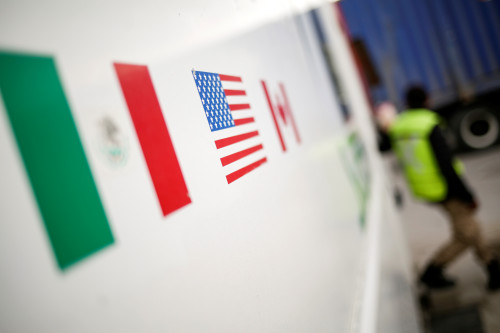By David Lawder and David Shepardson
(Reuters) – Canada and Mexico won protections against potential new U.S. auto tariffs in 2018 as part of the U.S.-Mexico-Canada Agreement on trade, but there is no evidence that President Donald Trump will honor those commitments as he imposes 25% duties on global automotive imports.
The side letters to the USMCA trade deal agreed to by Trump’s first administration granted both Mexico and Canada a 60-day delay on the imposition of any global auto tariffs as a result of his first-term Section 232 national security investigation into auto imports.
Once that North America-only grace period expired, Canada and Mexico would each get an annual duty-free import quota of 2.6 million passenger vehicles and an unlimited number of light truck imports.
The letters, signed by Trump’s former U.S. Trade Representative Robert Lighthizer, also granted Mexico a duty-free quota on annual parts imports valued at $108 billion and Canada a $34.2 billion parts quota.
The agreements further stipulate that even for automotive products that are non-compliant with USMCA rules of origin, the Section 232 tariffs cannot exceed the tariff rate in effect on August 1, 2018 for the two countries – effectively 2.5%. If upheld, this would provide relief to some automakers that had been shipping Mexican-built cars to the U.S. at that tariff rate, including BMW.
Trump revived the 2019 Section 232 investigation findings to impose the 25% tariffs that take effect on April 3, but White House officials made no mention of the 2018 USMCA side-letter promises, subjecting Mexican and Canadian-built vehicles to immediate 25% tariffs.
Instead, they said the only carve-out for Mexico and Canada was to deduct the value of any U.S. content from the 25% tariffs on U.S. vehicles and parts. Auto parts imports from Canada and Mexico will remain on a duty-free basis until the Commerce Department establishes a process for determining U.S. content value, with no specified deadline.
A separate issue is whether the deadline for the Section 232 auto tariffs expired in November 2019 under the original report.
Trump administration officials are aware of the issue, auto industry lobbyists said.
HONORING PAST COMMITMENTS
The Canadian government confirmed the USMCA auto side letters’ terms in an emailed statement to Reuters, and said it fully expects the U.S. to honor the agreements.
Canada also has the right to take retaliatory measures in response to U.S. Section 232 tariffs that are inconsistent with USMCA and World Trade Organization obligations, the statement said.
“Mexico is evaluating all the legal aspects before the USMCA and the WTO,” said Luis Rosendo Gutierrez, the Mexican Economy Ministry’s undersecretary for foreign trade. “The most important consideration is to identify what is best for Mexican consumers and producers.”
The Office of the USTR and the Commerce Department did not respond to Reuters’ queries on the matter.
The White House did not address questions about the protections but said: “America cannot just be an assembler of foreign-made parts – we must become a manufacturing powerhouse that dominates every step of the supply chain.”
Canadian Prime Minister Mark Carney spoke with Trump on Friday for the first time since taking office, a conversation described by both men as productive. But Carney won no commitment from Trump to ease tariffs on Canada, and warned the U.S. president that he would impose retaliatory tariffs after Trump’s April 2 reciprocal tariff announcement.
ROOM TO GROW
The auto quotas were meant to allow for some growth in Mexican and Canadian production. If honored, they would still exceed U.S. auto imports from the two countries.
The protections agreed to by Lighthizer removed a major stumbling block to the completion of USMCA negotiations as Trump separately pursued the auto trade probe. They are posted alongside the USMCA main text on the USTR website.
“The USMCA side letters for automotive were designed to prevent the very situation Canada and Mexico now confront – having to negotiate with the U.S. with the tariffs hanging over their heads,” said Dan Ujczo, a lawyer and former Canada trade envoy who specializes in U.S.-Canadian trade matters.
He noted that as USMCA negotiations came to a close in late 2019, the Trump administration granted tariff exemptions to Canadian and Mexican steel and aluminum imports, but Trump has since rescinded them.
“As with steel and aluminum, the end game for autos is increased domestic investment and resetting the quotas, along with preventing Chinese OEMs (original equipment manufacturers)” into the North American value chain, said Ujczo, who is senior counsel with Thompson Hine in Columbus, Ohio.
Lighthizer, who had been under consideration for senior Trump economic cabinet posts, declined to comment, referring a query to USTR.
(Reporting by David Lawder and David Shepardson; Editing by Paul Simao)


